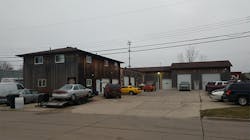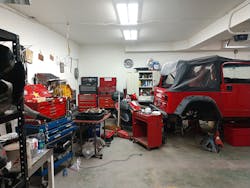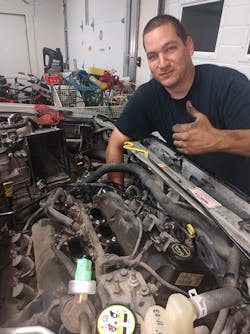Miracles for Vets helps get reliable transportation to those who have served our country
With all the problems military veterans face once they hang up the uniform, having a car that doesn’t work shouldn’t be one of them — at least not according to Miracles for Vets (M4V) in Grand Forks, ND. Founded by Larry Mendivil, Jr., Miracles for Vets is a grassroots-style non-profit which assists the automotive needs of military veterans.
As CEO, Mendivil would probably be the first to admit that the enterprise had evolved rather than was established. “We didn’t have any vision for a company, just a way to have all these cool veterans stop by the garage while working on their cars.”
After he left the Air Force, his initial plan was to go into law enforcement, but a bad knee derailed that, so for a while Mendivil went into auto retail, where he noted other vets complaining about having cars that wouldn’t run or not having a car at all.
“My stepfather was a mechanic and raised me around cars,” he explains. “I don’t think I’m that great a mechanic, but we built cars together, helped out people in the neighborhood.”
Mendivil was thinking about creating custom 4WDs for disabled vets, and when he remarked it would be a miracle should his own car make it to the VA for an appointment, he had a name. But eventually the custom shop began morphing into something else.
“If one vet stopped by and needed a tune-up but didn’t have any money, I’d just buy the part,” Mendivil states. “I’ve got part of my disability and social security coming in, and I just started buying parts and putting them on for free, and that’s how it started coming together.”
While the facility is a two-stall garage with an office, it’s nothing like the average repair shop. Outside sits about five cars with a laundry list of parts that have to be acquired because Mendivil emphatically won’t give a car away to a veteran unless it’s reliable. “We keep a car for a month to make sure it’s going to last.”
According to Jason Sparks, a fellow Air Force vet who’s helped M4V on various projects, “most of the cars that are donated are in some sort of disrepair; quite a few of them are not running. So we all get together, donate money, time, parts if we can, to get a vehicle running.”
With no profit, no major pieces of equipment and no personnel except volunteers, M4V relies on this kind of networking to keep it all going. “We don’t have a tool sponsor,” Mendivil reports, “we don’t even have an air compressor that’s all that big.”
On the plus side, M4V is all over the social network, where they can find a steady demand for maintenance and light repairs from veterans like John Ellis.
“The timing belt had slipped on my ’06 Suzuki Reno, and my dad, being a mechanic, said it wasn’t worth the work,” recounts the young Army vet. So he called Mendivil about an online post he had seen; Mendivil in turn made an hour drive to Ellis’s residence and got the Suzuki up and running.
"He told me it should get me by for either the life of the engine (which probably wouldn’t be long), or until I got a new vehicle,” says Ellis. “I jumped onboard (M4V), because Larry’s got that personality that draws you in, makes you want to help and know more about the cause.”
What’s the hook? For Jason Sparks it was the idea of paying it forward. “Larry and I served together,” he says. “We deployed a couple times to the Middle East, then he got out and I did my whole 20 and retired. Later I ran into him at an auto parts store.”
Mendivil was getting parts for another veteran’s car; Sparks decided to tag along. “I’m a motorhead too,” he admits. “Cars are kind of my getaway; I’ve got some classic cars which I show. So I paid for some of the parts and helped Larry work on this car.”
A Honda with 330,000 miles on the odometer, the vet who owned it was attempting to visit a son he hadn’t seen in a long while. “We spent $300 on parts,” Sparks recalls. “Got it all tuned up, running really good, but unfortunately the very next day it dropped a cylinder. But Larry had another car which had been donated, and we got that fixed up and gave it to the vet, so he was able to go see his son.
“The whole thing is me helping my fellow vets,” Sparks points out. “We all served, we all have our own demons to deal with, but the bottom line is we had each other’s backs during the war; now that we’ve come back home, the one thing a vet can count on is a fellow vet.”
Part of a core network doing donations, Sparks notes he’s also volunteered knowledge. “Larry’s got a pretty good database, but on some of the more intricate troubleshooting he’ll call me up. I can coach him over the phone, but if I’ve got some free time I’ll stop by and take a look. I help out as much as I can, when I can.”
Sparks has even supplied and cooked food for M4V fundraisers. “I’m nowhere near rich; I live okay. My wife and I still live paycheck to paycheck, and sometimes I give more than I should, but at the same time there’s a chance for me to pay it forward. With my own service, there were times I felt like I wasn’t there or did enough. So part of it is personal; the old NCO looking out for his airmen. My motto when I was a supervisor was ‘always take care of your guys.’”
Meanwhile John Ellis is M4V’s Project Coordinator, who along with Mendivil and three other people makes up the charity’s board of directors. “If there’s something we can do to assist a veteran,” says Ellis, “we definitely make a reasonable attempt. (For instance), thanks to the internet we’re even assisting a veteran in Pennsylvania trying to get a vehicle.”
While he knows nothing about cars, Ellis formatted the charity’s paperwork—applications, grant proposals, donation request letters—as well as set up the website. “Before joining the team I actually didn’t know anything about web design,” he explains. “I took a course where I learned the basics, and as more things arose, I learned how to do the external links, developed a shop and did all these other things. Thankfully there’s You Tube!”
Ellis was even inspired to come up with his own projects. “In mid-2017 we official started a veterans’ employment program where we assist in resume writing, interviewing, cover letters, applications, the whole 9 yards. I’ve got a couple veterans in Oklahoma I’m assisting with that.”
How do you really make miracles happen? Lots of good will and hard work.
About the Author
Robert Bravender
Robert Bravender graduated from the University of Memphis (TN) with a bachelor's degree in film and video production. Now working at Masters TV, he produces Motorhead Garage with longtime how-to guys Sam Memmolo and Dave Bowman. Bravender has edited a magazine for the National Muscle Car Association, a member-based race organization, which in turn lead to producing TV shows for ESPN, the Outdoor Life Network and Speedvision. He has produced shows ranging from the Mothers Polish Car Show Series to sport compact racing to Street Rodder TV.





